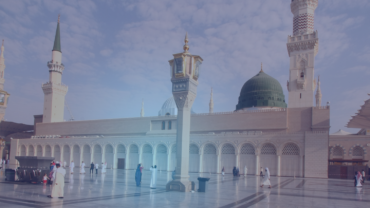
Hajj (pilgrimage) is one of the five pillars of Islam. It is an Ibâdah (worship) carried out with wealth and body. It was ordained (made Fard) in the ninth year of the Hijrah (Emigration from Makkah to Madinah). Rasûlullâh (sallallâhu alayhi wa sallam) appointed Hadrat Abû Bakr (radiyallâhu anh) in…

Ramadân al-Sharîf is the month in which the excellent qualities of Islam become more apparent and are practiced by the believers. Collective Ibâdahs (acts of worship) performed in various places are offered in this month with a sincere heart. Some of the Ni‘mah (gracious favours) of Allah Ta‘âlâ in Ramadân…

A mu’min should constantly strive to attain closeness to his Rabb through giving sadaqah, keeping (nāfilah) fast, Tahajjud Salāh and many other forms of ibādah (acts of worship). They should make more efforts especially during the Three Blessed Months (Rajab, Sha‘bān and Ramaḍān).Abū Bakr al Warraq (rahmatullāhi ‘alayhi), a walī…

Rasūlullāh (sallallāhu ‘alayhi wa sallam) said: “Whoever attends a gathering of dhikr (remembrance of Allāh), Allāh Ta‘ālā writes one thawāb (merit) of ibādah for each step he takes (while going to and coming from that gathering) and he will be together with me under the Arsh al-Ā’la (The Great Throne)…

Rasūlullāh (sallāllahu ‘alayhi wa sallam) said:When it is the half of Sha‘bān, stand in ibādah (prayers) in its night and fast its day.Whoever prays 100 rak’ah salāh on this night (of Barā’ah), Allāh Ta‘ālā will send them 100 angels. Out of these angels, 30 will give glad tidings with Jannah,…

Allah Subhanahu says in the 29th Ayah (verse) of Surah Al-Fatir: “Indeed, those who recite the book of Allah and establish their Salah and spend out of what we have provided for them secretly and openly (in the path of Allah) hope for a type of business that will never…

Rasûlullâh Sallallâhu Alayhi Wa Sallam said: “Had the people known about the virtue of calling the Adhan and standing in the first Saff (row) for Salah and found no other way than drawing lots to do that, they would surely do that.” (Muttafaqun Alayhi) Rasûlullâh Sallallâhu Alayhi Wa Sallam said:…

The day of Jumu‘ah (Friday) is held sacred by Muslims. It came in a Hadith Al-Sharif as follows: “The best day on which the sun has risen is Friday. Adam (Alayhis Salam) was created on Friday, on it he entered Jannah (Paradise), and on it he was taken out from…

Muslims are obliged to refrain from imitating the customs and traditions of Kuffar (infidels). Because it either leads one to Kufr (disbelief) or weakens their iman (faith). Allâh Ta‘âlâ says: “And whoever opposes the Prophet after the right path has been shown clearly to him, and follows other than the…

Wudû is a form of religious purity, which includes washing and wiping certain parts of one’s body in accordance with religious rules. One who is not in a state of Wudû is not allowed to perform Salâh, to make Tawâf (circumambulation) around the Holy Ka‘bah or to touch the Noble…

Rasulullah (sallallahu alayhi wa sallam) blessed the universe with his birth on the 12th of this month. Therefore, the twelfth of Rabi‘ al-Awwal is the night of Waladat (Mawlid), a sacred night in the Hijri Calendar. During this month, Muslims should engage in reciting Salawat (Durud) Sharif, such as Salat…

Rasûlullâh Sallallâhu Alayhi Wa Sallam said: “A person is together with whom he loves.” When a person’s heart inclines to someone, so does his mind and thoughts. Then, he tries to imitate the attitudes, state, and behaviours of the person he loves. Thus, they are both in a similar situation.…
